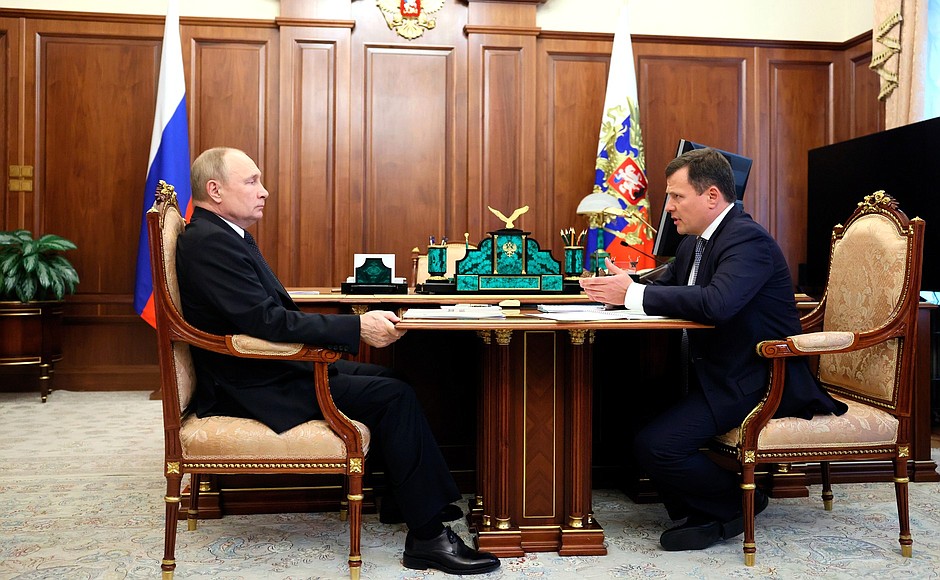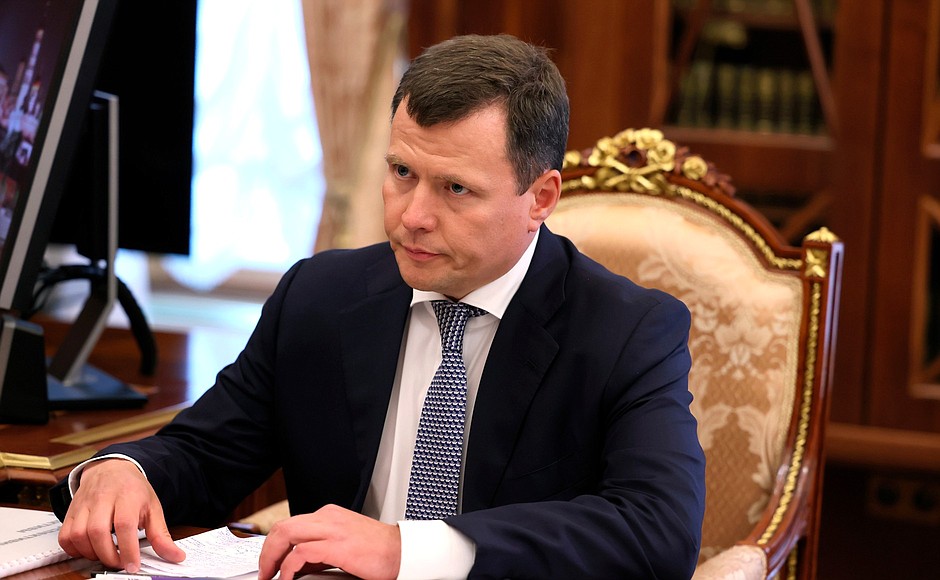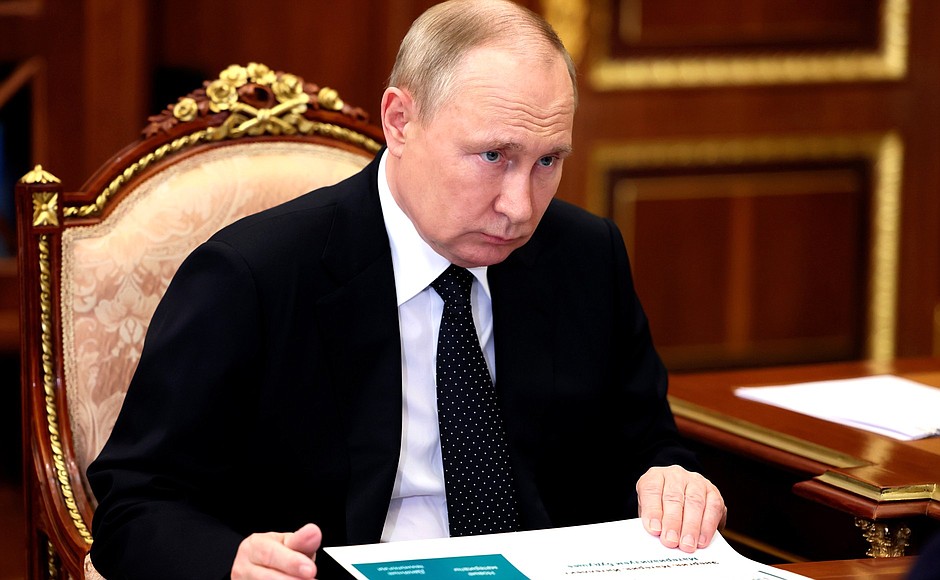President of Russia Vladimir Putin: Mr Kulikov, the company started working in its initial form in 2007. I believe that 150 enterprises have been established and about 40,000 jobs have been created since then.
Let us talk about its overall performance.
Chairman of the RUSNANO Management Company Management Board Sergei Kulikov: Yes, Mr President, you are quite right.
You as the founder and ideological leader of this programme know better than anyone that RUSNANO is not a mere state corporation or joint-stock company, or even a development institution. It is a symbol of investment in science, technology and the future.
I will try to focus on three aspects: technology, science and education, and money.
It is true that 150 enterprises have been established, and nanotechnologies have taken root in six technology clusters, including electronics, materials, optronics and solid waste disposal. As for research, 53 billion rubles have been invested in R&D, and 1,500 students graduate each year from nanotechnology departments at 28 universities in the country.
Just as we agreed in December, we have launched an initiative – not yet a programme – on the mathematical modelling of materials behaviour, which has yielded the first results in our advanced development models. We have done more than just begin: a laboratory at NUST MISIS has increased the capability of thermoelectric materials by 30–40 percent thanks to mathematical modelling. This year we have launched a new cycle with major players who are coming to see the fundamental importance of materials.
As for finance, we are repaying our debt. We returned the first 20 billion rubles last year. We meet those who ask for a discount halfway, yet interest is accumulating. I have prepared several proposals. I will submit them to you later.
And now, the good news: considering that 233 billion rubles have been invested in RUSNANO over the period you mentioned, by 2020 we earned 155 billion rubles by exiting some portfolios and assets. We increased that sum by another 50 billion rubles last year, overcoming the psychological barrier of 200 billion rubles and breaking even with investment costs. In our opinion, this is evidence of our company’s overall profitability.
As for being a symbol and not merely a joint-stock company, I would like to note that over the past decade we have proved the importance and accessibility of nanotechnology, and that competitive products cannot be created without researching the morphology of materials, as well as that it is worth investing in this. In fact, now is the right time to invest in this.
What achievements can we report? First of all, they are three professions.
Nanotechnologist: Frankly speaking, I personally tried to learn it without attending lectures, but I have come to the conclusion that it is better to do what I am good at, that is, create conditions for increasing the class of production engineers and nanotechnologists.
Techpreneurs are another important profession. We have launched a start-up studio at ITMO University [National Research University] as part of the University Techpreneurship Programme under the umbrella of the Ministry of Education. It is already producing interesting results. Our plans for this year provide for launching 14 start-up studios. The goal is to cut the distance between idea and product.
I can describe the third profession as R&D investors, the go-betweens linking business and science who know what projects money is allocated for and set the task to researchers, as well as those who look for interesting scientific ideas and raise funds for their implementation.
Regarding our portfolio, we have 51 assets left, 18 of which can be described as distressed, like Liotech, a producer of lithium-ion batteries in Novosibirsk. Its story is as old as the world: it went bankrupt several times, we tried to re-register it, but only managed to preserve its intellectual asset, that is, employees. We have found a use for them: we are operating system energy storage facilities together with Rosseti Centre in 11 regions, and we ensured their almost seamless operation, without accidents, in small residential areas during the last autumn and winter season. We are now working on the next generation of these solutions.
We have postponed our plans for selling 13 companies to 2023–2024 because they are needed now to support critical infrastructure. I will give a few examples.
For instance, there is Novomet in Perm – a wonderful company producing bottomhole pumps for the oil industry. We hope that if we start assembling them, we can acquire the know-how to become an alternative supplier or replace those who are changing markets today.
Russian Membranes in Vladimir, the heart and the basis for water treatment in general, not only desalination, which is used in the Gulf countries, our active partners, but also purification, which is particularly important today. As you know well, we have made agreements with two governors and are now working on relevant pilot projects.
Optovolokno is a company in Saransk, Mordovia. We have agreed with the governor and the Ministry of Industry and Trade to develop it to…
Vladimir Putin: You need input materials.
Sergei Kulikov: Of course. We will now finish building one more production area to ensure sustainability.
And, of course, three American and Japanese suppliers quit the market, and we are now competing only with the Chinese for a place in the energy cable and the telecoms cable market. It is difficult, but this is a very interesting task as well, and we can really grow.
We have moved these assets aside, as it were, but we will adopt a strategy all the same to attract private investors to these efforts.
Vladimir Putin: Is this realistic? Do you believe you can do this?
Sergei Kulikov: We do not have a choice. How can we not do it? This is especially important in the current conditions: people must communicate, and networks must be managed. There is no choice – we must do this by any means. If there is something we cannot supply, we must then look for ways to produce it.
We have prepared 20 assets for sale, including foreign ones. This applies to alternative energy assets, which you know about. We are quitting them and reconfiguring our teams to take on new tasks. In other words, our energy specialists will deal with small-scale generation, the same system energy storage facilities, that is, some hybrid solutions that may be used today.
After leaving two waste incineration plants, we began to use this competence to look for breakthrough technologies. We discovered a great solution for ash-free recycling by building two reactors. Rosprirodnadzor [the Federal Service for Supervision of Natural Resources] is studying them thoroughly and is surprised by good results, but they are still testing to make sure there is no error. There are no emissions, because there is no combustion. I will show you this design after I finish my report.
You are aware of the nanotube manufacturer that went all the way from a start-up business – the first four stages of technology maturation – to an IPO. This in fact highlights RUSNANO’s function where we pick a project up from the first to the fourth phase and from the fourth to the eighth phase and then bring it to market or make it a strategic partner.
We teamed up with the founders and made the nanotube usable in electric vehicle components this year and we are now doing pilot road tests. For example, we added nanotube technology to the asphalt on the Moscow–Don highway to see that no wheel track grooves were formed at 50 degrees Celsius. I think this deserves to be run as a separate project, perhaps, a 10-year or longer programme, in order to see how effectively our roads can endure.
In the end, investors started coming to us and our portfolio grew by 30 percent last year. About 65 billion rubles of extra-budgetary funds have been received by RUSNANO before 2020. But last year alone, we attracted 68 billion, of which only 4 billion were our own funding, with the rest coming from outside sources.
As for evolving, (as you may be aware, RUSNANO started as a state corporation and eventually became a joint-stock company), we are probably ready to think about public-private partnership. That is, we can increase the share of private investment in the newly created foundations. Based on our strategy, in the first half of its implementation we will be attracting funds at a rate of 1 to 4, that is, for every ruble of state or quasi-state money there will be 4 rubles from the outside, and 8 rubles by the end of the implementation period.
The team was reset; we did this with respect to the founders. In fact, we are even forming the RUSNANO university club. We attracted multiple young colleagues, added competencies that we lacked, and are now using earlier achievements and the groundwork that we formed today for projects in the ecology, healthcare, mobility, energy and, of course, security.
Vladimir Putin: You and I understand, though, that improving the financial situation is among our key goals in this regard.
Sergei Kulikov: Yes, absolutely.
<…>


